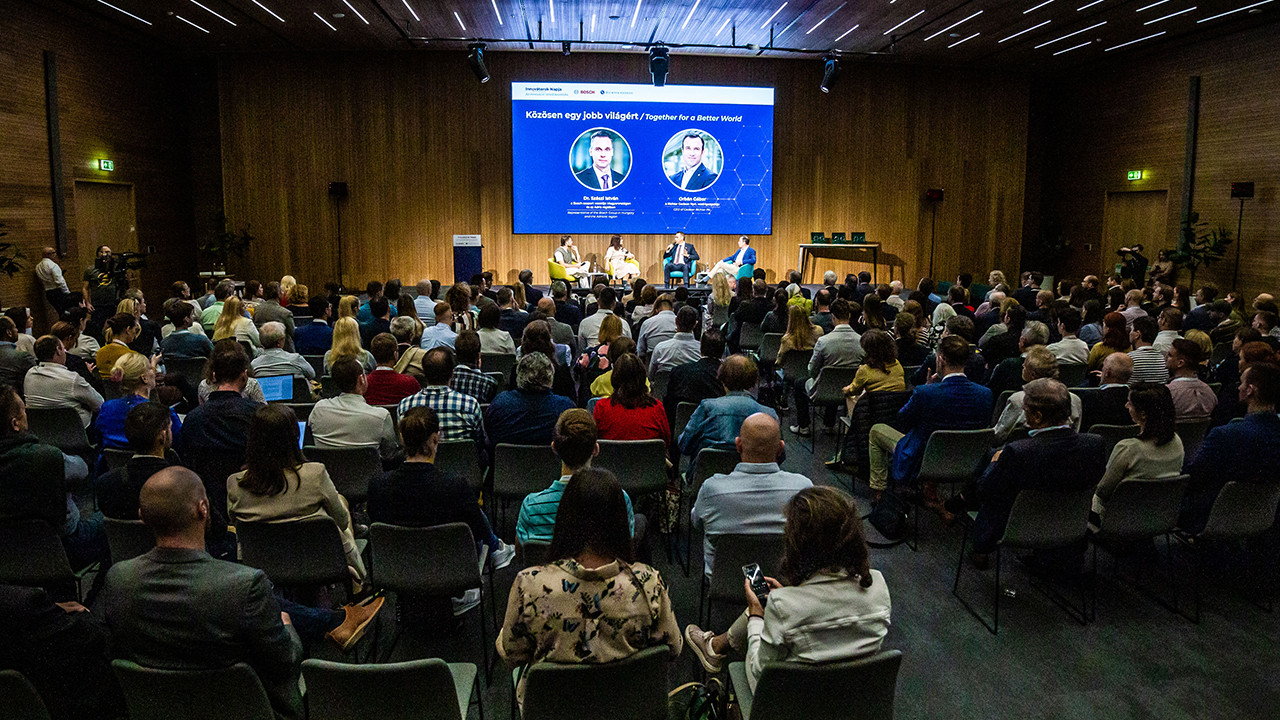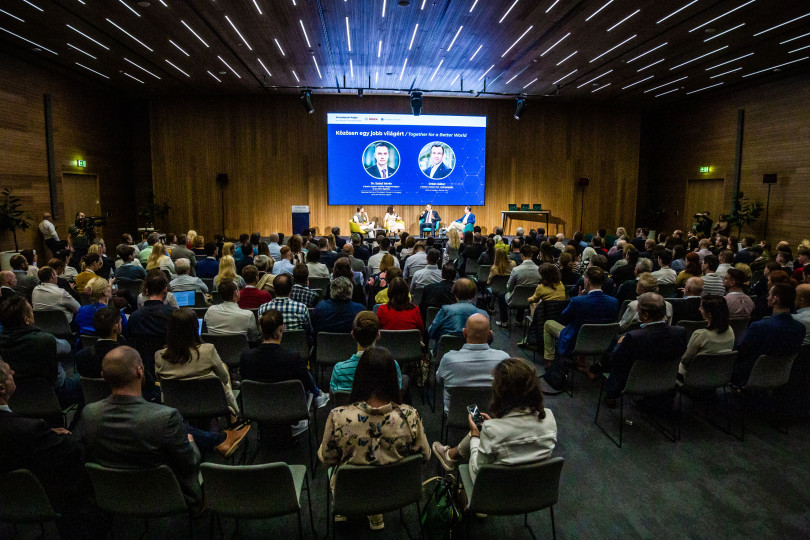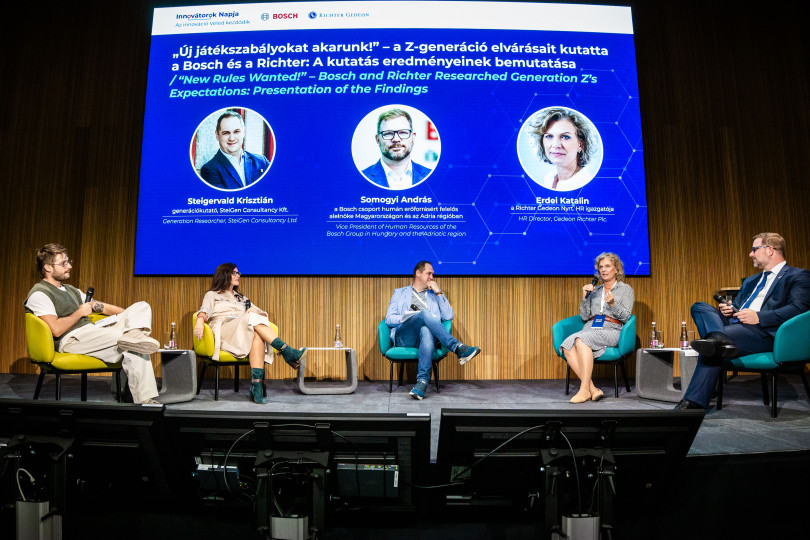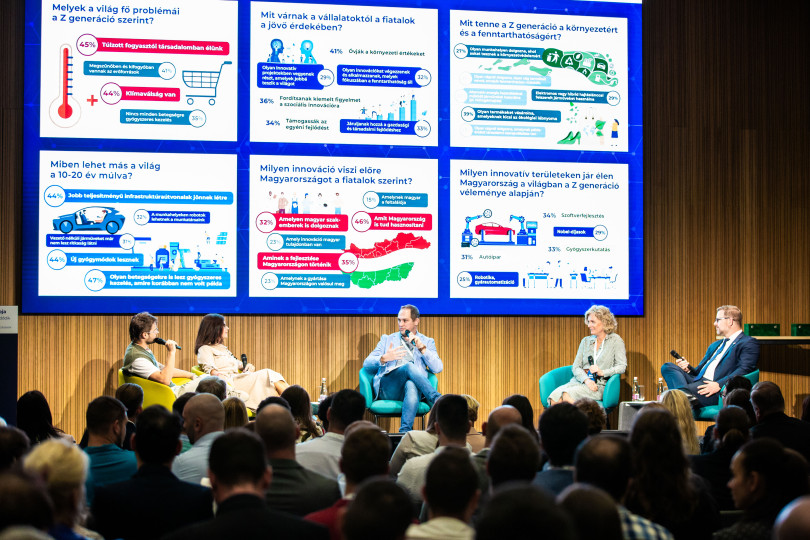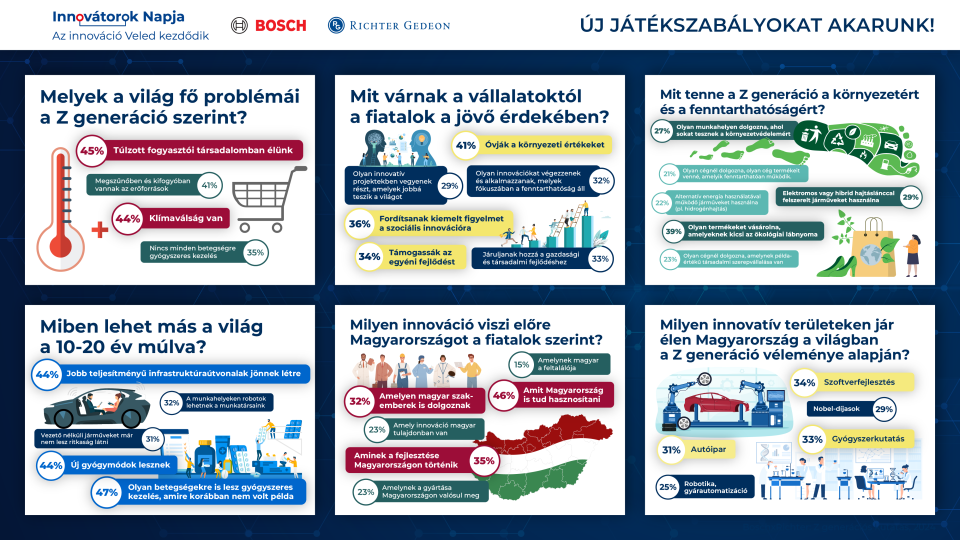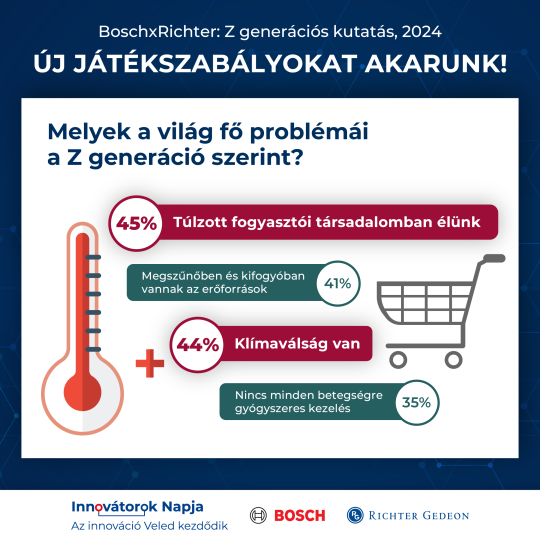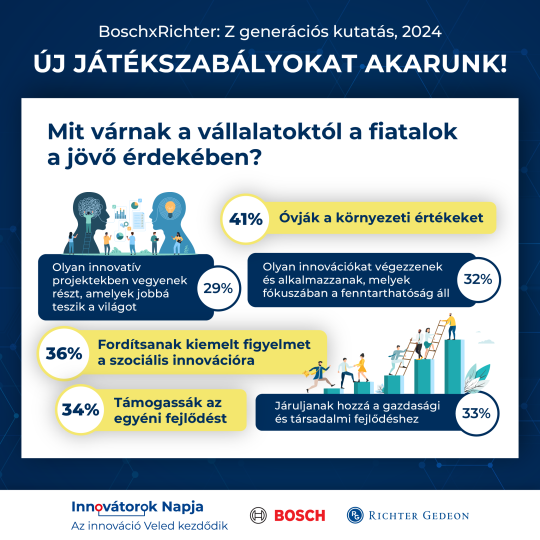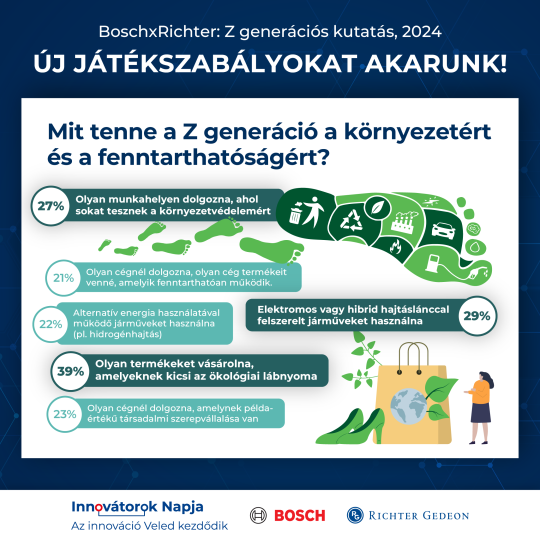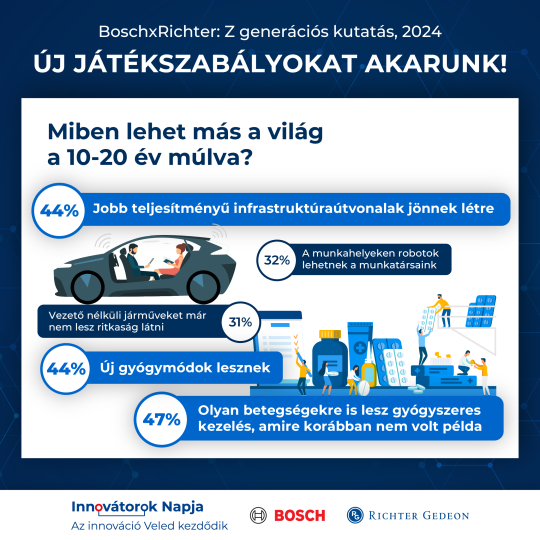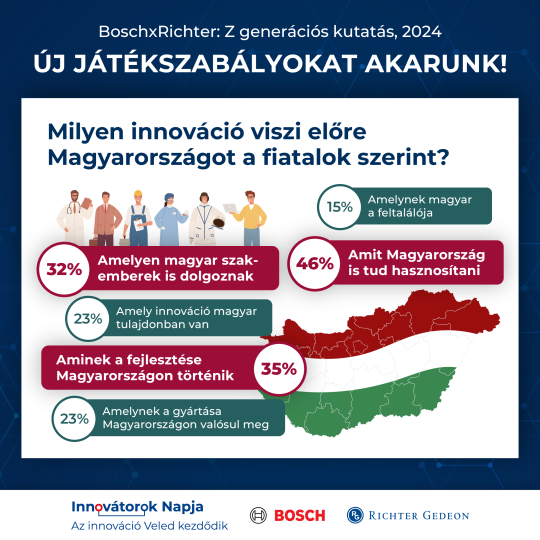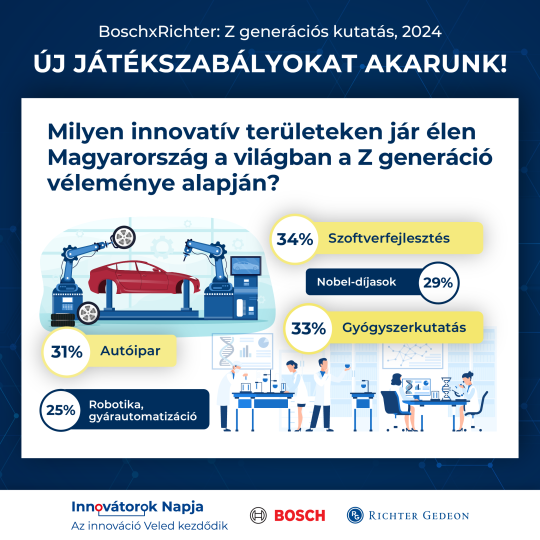Budapest – For Generation Z, those born between 1997 and 2012, innovation is now much more than technological progress. What changes might this new outlook bring to the economy, higher education, the workplace, transport or medicine? This time, two of Hungary's leading innovative companies, the Bosch Group in Hungary and Gedeon Richter Plc., explored the issues of the future and innovation from the perspective of Generation Z in a joint opinion poll. The new research results were presented at the Bosch×Richter Innovators' Day on 25 September 2024 at the Bosch Budapest Innovation Campus.
They would redesign consumer society
More and more often, we hear the adjective innovative in everyday life to describe companies and products that are cutting-edge, new and moving the world forward. While nearly four-fifths of Generation Z (78%) understand the term, the research looked in detail at what young people expect from technologically leading, innovative companies.
As Generation Z members identify the challenges of consumerism (45%), the climate crisis (44%) and dwindling and depleting natural resources (41%) as the most important issues facing the world today, the majority (53%) believe that these are the problems that companies can help alleviate. Many (41%) would like to see the preservation of environmental assets and the use and development of innovations with a sustainability focus (32%). More than two thirds of young respondents see innovation as a way to promote (59%) or directly contribute (9%) to an environmentally conscious and sustainable lifestyle.
Let's take responsibility for each other!
Corporate social responsibility is also seen as important by young people, with more than a third (36%) expecting companies to pay special attention to social innovation, and almost as many (33%) think that companies should contribute to economic and social development, with support for individual development also among the top priorities (34%).
On the threshold of the green era: young people would switch to electric vehicles and alternative energy
For young people, it is clear that while the responsibility of companies is paramount, businesses alone will not be able to solve the sustainability challenge, and that everyone, at an individual level, must contribute. This is why Generation Z is ready to change their lifestyle when it comes to the environment and a sustainable future. The largest proportion of respondents (39%) said that they would buy products with a small ecological footprint in the future. Many (29%) plan to use vehicles with electric or hybrid powertrains (scooters, bicycles, cars), but would also switch to other alternative energy sources such as hydrogen in the future (22%).
The Bosch×Richter research shows that sustainability expectations of companies are also reflected in the decisions of employees. More than a quarter of Generation Z employees (27%) would like to work in a workplace that does a lot to protect the environment (such as a zero-carbon company) or has an exemplary corporate social responsibility program (23%).
New cures, self-driving vehicles and robot colleagues could be on the way
No one can say exactly where the world is heading, but when you ask Generation Z about their vision, most expect the biggest advances in medicine and transport. According to the survey, in 10 to 20 years' time, most of today's young people (47%) expect to see medicines for diseases that didn't have cures in the past, and new methods of treatments (44%). Many think that in the future we will have better transport infrastructure than we do today (44%), and that it will be common to see driverless vehicles (31%) and robots in the workplace to make our jobs more efficient (32%).
Mentoring could be the future, not teaching: Gen Z wants personal talent management and real challenges
It is clear that innovation does not come about by itself but needs to be actively supported by the whole education system and by companies. But what are the needs of young people, typically in secondary and higher education or recent graduates? For Generation Z, the key to an innovative approach in higher education is talent management (40%), the possibility to get involved in international projects (40%) and research (36%) during their college or university years. For them the possibility to do internships in a real company environment (37%) is also very important. On the corporate side, the research shows that the most attractive innovative workplaces for Generation Z are companies that support creative freedom and the realization of ideas (48%), offer opportunities for professional development and career progression (46%) and help young people starting their careers to find a job (44%).
This is the Generation Z workplace: innovation and human relations at all levels
More than two thirds (70%) of Generation Z members explicitly want to work in an innovative workplace or company in the future. However, the research also shows that flexible working arrangements and home office opportunities are seen as more important than any other aspect in terms of work-life balance (44%). This is seen as an important benchmark for companies' innovative approach and the workplace of the future. It is also important for Generation Z that workplaces use the latest technologies (37%) and offer a modern, aesthetic, ergonomic environment that fosters innovation and creativity (37%), providing inspiring and exciting spaces for collaboration and relaxation (30%). The data shows that young people's perception of the workplace is clearly driven by personal and human factors, which outweigh even aspects such as artificial intelligence (24%) or robotics (14%) in the workplace of the future.
What is innovation like if it is Hungarian?
In addition to global challenges and international innovation trends, the survey also looked at domestic aspects. The research asked Generation Z what type of innovation they think can drive Hungary forward. Almost half of the respondents (46%) said that the most important thing from this point of view is that Hungary can benefit from the innovation in question. Around a third of young people believe that a good innovation for the country is one that is implemented in Hungary (35%) or that involves Hungarian experts (32%), while only a few (15%) consider it important that the name of a Hungarian inventor is linked to a particular development.
The results show that the top three areas where Hungary is leading the way in innovation today, according to Generation Z, are software solutions and software development (34%), pharmaceutical research (33%) and the automotive industry (31%). Three quarters of respondents (75%) consider it important that Hungarian companies and Hungarian professionals are involved in the development of the world through innovation processes. The survey results show that the vast majority of Generation Z in Hungary consider the Bosch Group (88%) and Gedeon Richter Plc. (89%) to be at the forefront of innovation.
Research methodology
The fieldwork of the research took place in July 2024, and data was collected using the CAWI (online questionnaire) method. Sample size: n=5090, of which Generation Z: n=513. The survey was conducted by SteiGen Consultancy Kft. on behalf of Bosch and Richter, research manager: Krisztián Steigervald.
Zita Hella Varga
Phone: +36 70 667-6374
Bosch has been present in Hungary since 1898 with its products. After its re-establishment as a regional trading company in 1991, Bosch has grown into one of Hungary’s largest foreign industrial employers with currently eight subsidiaries. In fiscal 2023 it had total net sales of 2.207 billion forints and consolidated sales to third parties on the Hungarian market of 343 billion forints. The Bosch Group in Hungary employs more than 18,300 associates (as of December 31, 2023). In addition to its manufacturing, commercial and development business, Bosch has a network of sales and service operations that covers the entire country.
The Bosch Group is a leading global supplier of technology and services. It employs roughly 429,000 associates worldwide (as of December 31, 2023). The company generated sales of 91.6 billion euros in 2023. Its operations are divided into four business sectors: Mobility, Industrial Technology, Consumer Goods, and Energy and Building Technology. With its business activities, the company aims to use technology to help shape universal trends such as automation, electrification, digitalization, connectivity, and an orientation to sustainability. In this context, Bosch’s broad diversification across regions and industries strengthens its innovativeness and robustness. Bosch uses its proven expertise in sensor technology, software, and services to offer customers cross-domain solutions from a single source. It also applies its expertise in connectivity and artificial intelligence in order to develop and manufacture user-friendly, sustainable products. With technology that is “Invented for life,” Bosch wants to help improve quality of life and conserve natural resources. The Bosch Group comprises Robert Bosch GmbH and its roughly 470 subsidiary and regional companies in over 60 countries. Including sales and service partners, Bosch’s global manufacturing, engineering, and sales network covers nearly every country in the world. Bosch’s innovative strength is key to the company’s further development. At 136 locations across the globe, Bosch employs some 90,000 associates in research and development, of which nearly 48,000 are software engineers.
Additional information is available online at www.bosch.hu, iot.boschblog.hu, www.bosch.com, www.iot.bosch.com, www.bosch-press.com, www.twitter.com/BoschPresse
About Gedeon Richter Plc.:
Headquartered in Hungary, Richter is an innovation-driven, specialized multinational pharmaceutical company. The activities of the Hungarian-directed Gedeon Richter Plc. are vertically integrated: they involve pharmaceutical manufacturing, research and development, and the corresponding sales and marketing. Its strategy is based on organic growth, complemented by targeted acquisitions, mainly in the field of gynecology. The company's mission is to preserve health and improve quality of life, including by bringing to market original and biosimilar products with high added value in areas where Richter has specific expertise in development and manufacturing. With a 123-year history, Richter has manufacturing subsidiaries in five countries in addition to its parent company and distributes its products through its own market network to almost 100 countries around the world. The Company employs nearly 12,000 people and had sales of more than 2.1 billion euros in 2023. The Richter Group relies on the commitment of its employees at home and abroad, its manufacturing and research experience of more than a century and works closely with its strategic partners to make its innovative products available worldwide.
Richter is the largest Hungarian pharmaceutical company. The company has sales activities on five continents and a direct presence in more than fifty countries. In total, the Richter Group consists of 64 member companies, of which 47 companies are active in the production and sale of pharmaceuticals, 8 companies are active in the wholesale and retail distribution of pharmaceuticals and 9 companies are active in other service activities. 93% of the Company's pharmaceutical sales are generated by its export activities: that amounted to 1,820.2 million euros in 2023. Our largest international markets are the USA, Russia, Poland, Germany and Spain.
Richter is one of the largest employers in Hungary, directly employing 5,600 people and a further 13,000 through its suppliers. Founded in 1901, Richter is the only pharmaceutical company in Hungary, which is also a dominant player on international markets, to operate without a foreign professional investor and under Hungarian management. Accordingly, the company's management makes decisions in the interests of the Hungarian national economy. Richter continues its research activities, makes investments and pays taxes in Hungary. The profits generated in foreign markets are also reinvested in Hungary, thus making a significant contribution to increasing the competitiveness of the country. In 2023, Richter's contribution to the national economy amounted to more than 188 billion forints in the form of taxes, investments and R&D expenditure.

